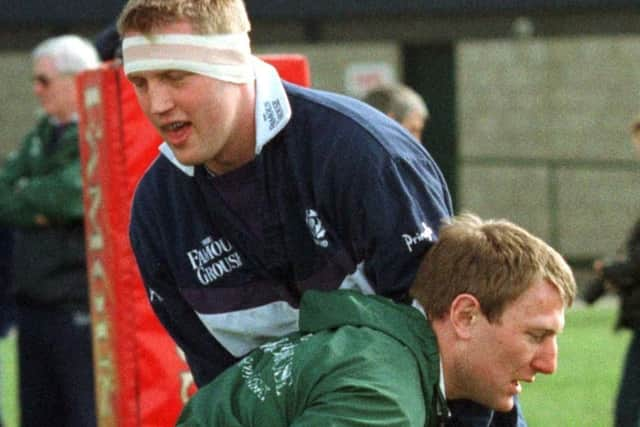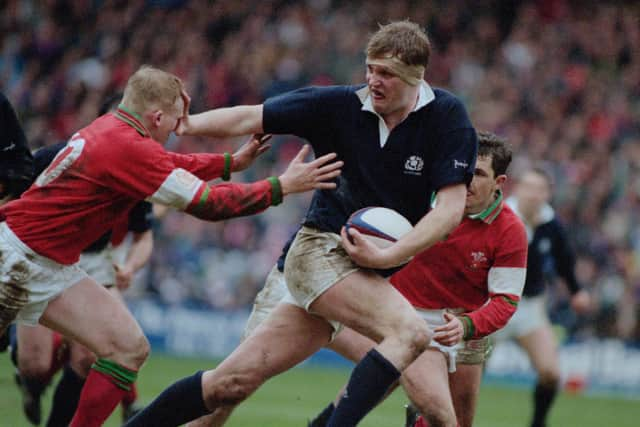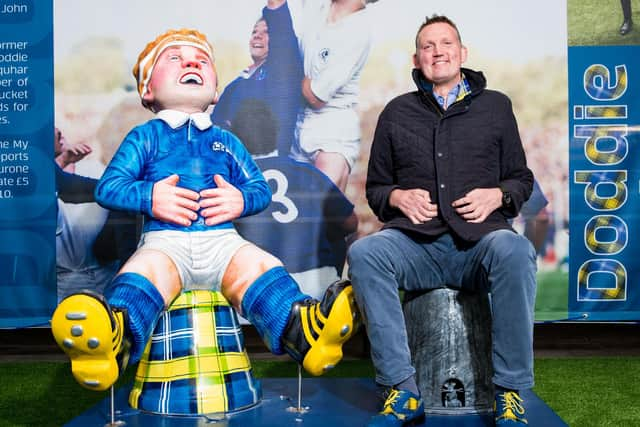Call for stand at Murrayfield to be named after Doddie Weir - 'he was an absolute legend of a man'
Weir’s death at the age of 52 was announced on Saturday following his long battle with motor neurone disease. He worked tirelessly to raise awareness of the condition and set up a foundation to fund research and help those suffering from MND. Chalmers, who played alongside Weir for Melrose and Scotland, said it would be a fitting way to celebrate his work on MND and his contribution to Scottish rugby.
“It’s a very sad time and I think the SRU should name the West Stand after him,” Chalmers told The Scotsman. “They should make it the Doddie Weir Stand. It would be a great tribute to the big fella. At the moment it’s just North, South, East and West stands, so why not?”
Advertisement
Hide AdAdvertisement
Hide AdChalmers was two years older than Weir and was already an established Scotland international when the latter broke into the side at Melrose. He recalls an initially quiet lad who soon found his voice at the Greenyards and went on to be part of the side which dominated Scottish club rugby in the early to mid-1990s.


“He came wandering into Melrose as a skinny 18-year-old and there wasn’t much of him but he got more confident week by week, or day by day – he certainly wasn't shy. The biggest thing about Doddie was that smile he had. He never looked angry, even when he was getting in a fight on the rugby pitch he had a big smile on his face – he was a happy cheery guy.
“He could be serious at times, he took his rugby seriously although some people thought he didn’t because he was this big happy-go-lucky chap, but he did. He cared. He was a talented player. I wouldn’t say he was the hardest trainer in the world. He tended to avoid the gym but he could do all the basic skills. He could play, he could pass, he could read situations.”
At 6ft 6in, Weir was particularly handy in the lineout, even if it sometimes came at a cost to his personal safety as he discovered in one particularly feisty Calcutta Cup match. “There was no lifting in the lineouts in those days and Doddie was invaluable because he could jump,” recalled Chalmers. “He was tall and athletic. That’s why Wade Dooley punched him in the ear in 1992 and perforated his eardrum – because he was a threat.
“We had some great times and some great laughs. At Melrose we won championships and had some great times on and off the field. There was a great camaraderie between the likes of Carl Hogg, Bryan Redpath, Steven Brotherstone, Graham Shiel, Stevie Scott, Craig Redpath. All these guys were coming through at the same time, playing for the South and Scotland A or B or whatever. It was a great environment to be in.”


Chalmers and Weir were synonymous with Melrose’s glory years but if Weir’s father Jock had had his way his son would have been pulling on the maroon of Gala.
“Doddie’s dad had played for Gala and was a Gala man but Doddie played for Melrose so big Jock wasn’t too happy.,” said Chalmers. “But he was a bit like Doddie, a big easy going cheery chap. Doddie had an edge to him as well, mind you. Don’t be fooled by that big smile. He could hold his own in any environment.”
He needed to. As his rugby prowess grew, representative honours soon followed. First with the South, and then Scotland, the Barbarians and the Lions. As the sport turned professional in the mid-1990s, the talents of Weir and Chalmers were soon in demand. Newcastle Falcons came calling, and Weir was lured south with another great Borders player, the Jed-Forest scrum-half Gary Armstrong. Backed by John Hall’s money, Newcastle become a major force in the game, winning the English league in season 1997-98 and the national cup three years later. Weir and Armstrong were in the vanguard and the bond they developed got stronger following Weir’s MND diagnosis at the end of 2016. Armstrong became a trustee of Weir’s trust and a pillar of strength for his former team-mate.
Advertisement
Hide AdAdvertisement
Hide Ad“Gary Armstong would never say this, but he has done so much for Doddie,” said Chalmers. “He’s been there all the time, helping him out, taking him here, taking him there. He’s been his chauffeur and has carried him places. He’s been unbelievable.”


The work of the My Name’5 Doddie Foundation, led by its CEO, the broadcaster Jill Douglas, has helped raise awareness around MND, as well as supporting those affected by the disease and striving help find a cure. Chalmers believes it will be the 61-times capped Scotland player’s legacy.
“People shouldn’t forget the rugby stuff but what Doddie’s done over the last five years for the MND community and raising awareness has been unbelievable,” said the former stand-off. “The people he touched over the last five and a half years, since he found out about it, has been amazing. The money that has been raised and the awareness that has been raised. He never stopped.”
Chalmers, who is now based in England, is returning home this week for a fundraiser for his former team-mate. “I’m actually driving up to Scotland on Monday and I’m doing a dinner for him on Thursday night. The last time I saw him he said to me, ‘When I’m gone you’re still going to be running around after me, Chic. You’ll be doing golf days, doing dinners, raising funds.’ And he’s spot on!
“We’ve all got our great memories of him because he was an absolute legend of a man and it’s hard to register that he’s no longer going to be about.”
Comments
Want to join the conversation? Please or to comment on this article.
